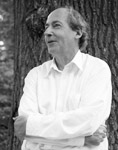
© G. Bompais
Poemes d'Alliance
It was two years ago that Marie Prost and the trio Besozzi asked me to write a piece for their group that would link in an original way the soprano voice and three wind instruments of the "double reed" family (two oboes, one bassoon). I then looked for quite a long time for texts that would suit this unique mix of timbres, but also for texts that I could bring this verb and sound fusion to, which is one of the problematic of the musical writing on a significant text… Quite by chance, I discovered these superb poems by Andree Chedid, as well as the warm personality of their author, who allowed me with an enthusiastic generosity to choose the texts that would suit me best and to organise them as I pleased.
This is how two cycles were born : "Poemes de Revolte" ("Poems of Revolt") and "Poemes d'Alliance" ("Alliance Poems"), both taken from different collection of poems that Andree Chedid wrote and published between 1946 and 1960.
The second of these cycles, that I mention here, "Poemes d'Alliance", comprises of six texts :
The voice
When hope deserts us
Song for tomorrow
The woman of long patience
Watching childhood
Brief guest.
These are - in my eyes at least - poems of love, alliance, hope and despair, mixed, tinted with some sort of nostalgia, of a melancholy that makes way to a characteristic smile and tenderness. It is these subtle expressive nuances that I tried to express in this cycle.
In each of these successive poems, the voice is essentially singing, melodic, either in vast expressive intervals or like a recitative, a psalmody around a note. The form, often partially stanzaic, follows pretty faithfully the form of the poems - the rhythm as well. The frequent presence of obstinate rhythms (first and fifth poems) or of held notes (first, second and fourth poems) can give an impression almost nocturnal, contradicted by certain movements towards the more luminous soprano's high pitch. Like an homage to ancient music, the last poem consists of an everlasting melodic counterpoint between the voice and the oboe d'amore or the English horn. It concludes the piece in a soothed atmosphere, almost meditative.
Audio sample : performed by Marie Prost, soprano, and the Trio Besozzi
(Marc Badin, oboe/oboe d'amore, Patrice Barsey, English horn, Herve Issartel, bassoon)